We all probably went through that phase in high school and maybe even early as middle school, where we were still trying to “find ourselves”. Actually, truth be told, I’d say that almost all of us are still in that phase even this late in life (and that’s ok!!).
Though ideas and concepts around identity and personality are fairly widespread and often subjected to personal interpretation, we have a fair amount of theories and notions that can help us set a foundation!
After this chapter overview, hopefully, you have a better idea and introduction to some basic theories about identity and personality. Let’s get started!
Identity and Personality on the MCAT: What You Need to Know
Topics on language and memory will be tested on the Psych/Soc section of the MCAT and can appear both as passage based and fundamental discrete questions.
Here at MCAT Mastery, we’ve calculated that you can expect about 3-4 questions concerning identity and personality to appear on the MCAT!
Introductory psychology accounts for 65% of the content covered in the Psychological, Social, and Biological Foundations of Behavior while introductory sociology covers about 30 of the content.
Important Sub-Topics: Identity and Personality
When approaching your study and review of the ideas and concepts of identity and personality, try making a general summation table listing out the different theories and their main postulations.
For the table above, don’t be too worried yet about the different stages and all that stuff — this starting table should just be used as a starting point to compare and contrast what each theory is based upon!
1. Types of Identity and Self Evaluation
While we all try to describe and characterize ourselves via our identities, it’s actually better to describe who we are as unique individuals via what social scientists term a self-concept. Our self-concept is the collection of how we view ourselves as unique persons and basically answers the question: “Who Am I?”.
Again, it’s important to differentiate between self-concept and identity, though they’re very much interrelated! Think of it this way: our individual identities compose our self-concept. One thing to note about our identities is that how predominant a type of identity is depends on the context of the underlying setting.
For example, a person’s religious Christian identity perhaps may be strong when attending church mass, but may be weak and falter when surrounded by social peers at a party with a lot of drinks. There are many types of identity such as gender, age, socioeconomic class, etc., which all come together to create our self-concept.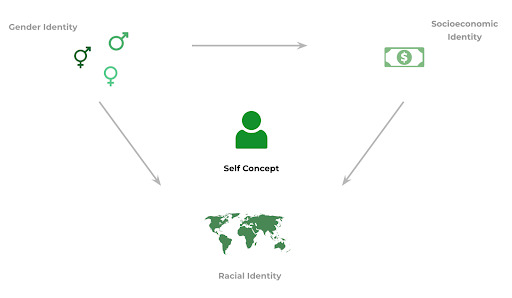
Let’s also introduce the terms self-esteem and self-efficacy which are important terms to define as they relate to self evaluation. Self-esteem refers to your overall perception and value for yourself — try to picture it as thinking very high or low of yourself (side note: always think highly of yourself: you’re amazing!).
Self-efficacy refers to the confidence in one’s ability to perform a task or goal of some sort. For example, Devin Booker probably has a high self-efficacy that he can go for 30 points in an NBA game.
The important thing to note is that these 2 aren’t necessarily related directly — for example, a person may have high self-efficacy that he can do well on a test, but may still have low self-esteem and regard for himself. Sometimes, imposter syndrome can manifest in this way!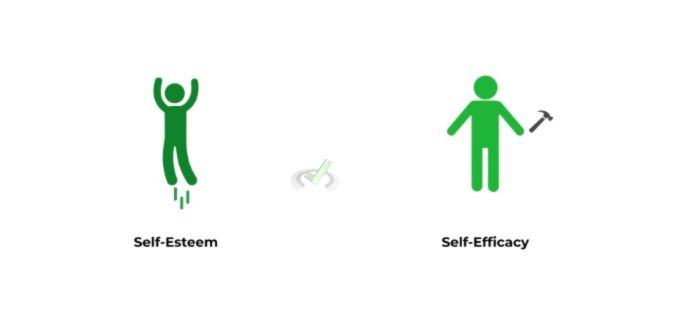
(Coming Soon!) Full Study Notes : Types of Identity and Self Evaluation
For more in-depth content review on some of the terms and definitions for identity and self-evaluation, check out these detailed lesson notes created by top MCAT scorers.
2. Theories of Identity Formation
Over the course of the developing field of psychology, many attempts and theories have been made in order to hypothesize how individuals develop their identities. We’ll cover a couple of the main ones and expand on others in our more specialized articles but try to pay attention to the stages and associated age ranges as these are typically tested on!
One important theory to mention is Kohlberg's theory of moral development, which is special as it deals with how identity is developed as a result of our maturation in thinking. Some of the other theories tend to explain identity formation as a result of needing to relieve some unresolved tension.
Kohlberg’s theory can be divided into 3 main age categories: 1) preconventional morality (preadolescence), 2) conventional morality (early adolescence), and 3) postconventional morality (adolescence – in theory…).
In preconventional morality, the moral rationale for a kid’s actions is based on more concrete things, in this case, consequences for disobedience and the gaining of rewards. As such, the first and second stages of preconventional morality are obedience and self-interest.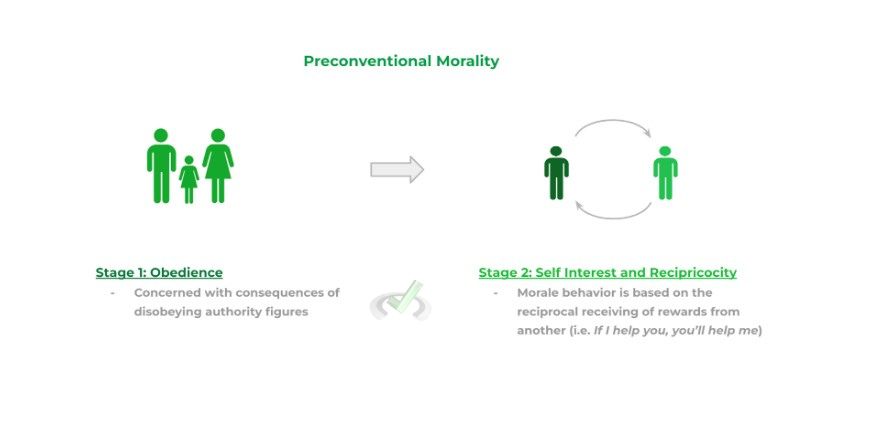
When we get into the stage of conventional morality, individuals around the teen and early adolescent age form the rationale of their morality by wanting to conform to societal norms. Similar to the preconventional stage, the conventional stage is divided into 2 main stages: stage 3 which is conformity, and stage 4 which is law and order.

The last stage of postconventional morality primarily deals with more abstract concepts compared to the ones we covered prior. It’s actually theorized by Kohlberg that very few people actually reach this stage of moral maturity!
Stage 5 promotes the support for the individual rights of a person – this gets into a very gray zone because individual rights and values might differ from person to person. Stage 6, which is termed universal principles, individuals justify their moral actions in order to protect the equality, dignity, and respect of each ind ividual.
Stage 6 is so unique and a mature depiction of morality as you may have to break some of the moral rationale that guided the previous stages. For example, maybe in order to promote the justice of an individual or group of people, you’ll have to break the law and order and obedience rationales that guided your previous stages.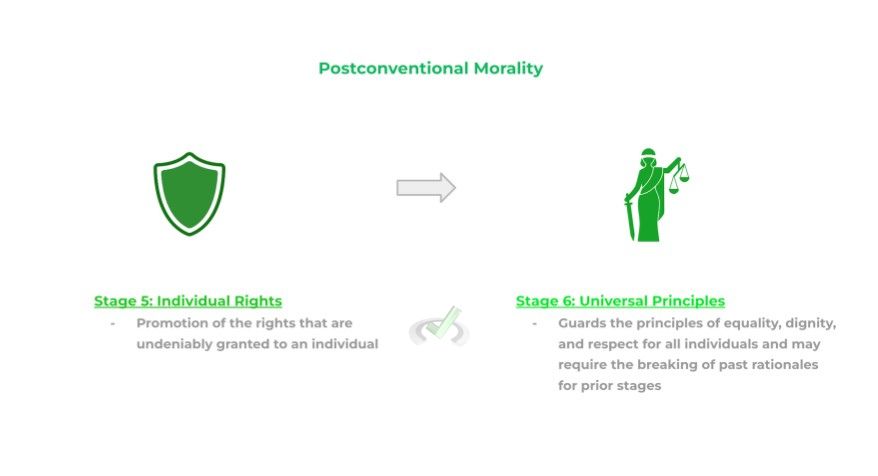
Another important theory to know is Erikson’s psychosocial theory of development. This theory is one example of identity development where one finds their identity by answering and resolving an existential question that Erikson poses.
While we’ll go into more specifics in regards to what each question means in our specific article, take a look at the table below! This gives a good summation of the Erikson’s psychosocial development as well as the associated ages.
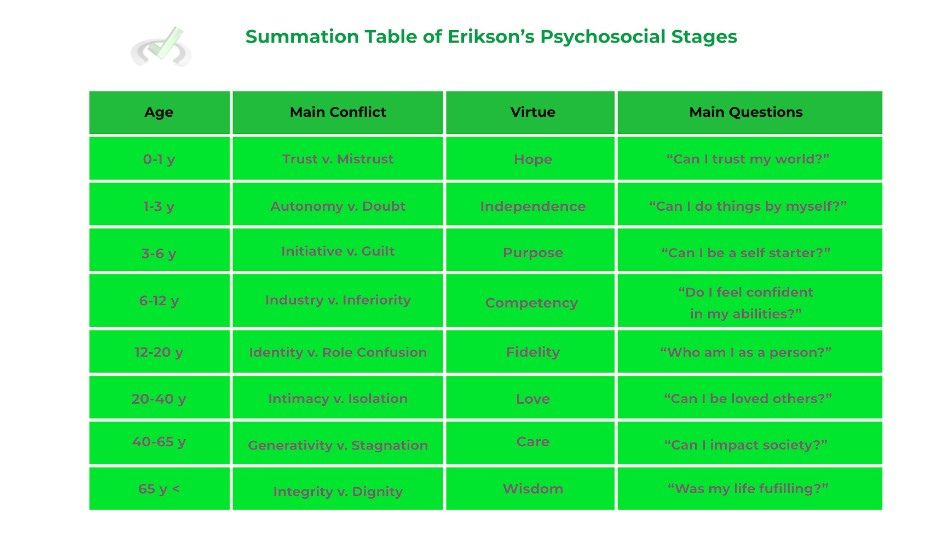
(Coming Soon!) Full Study Notes : Theories of Identity Formation
For more in-depth content review on the different theories encompassing identity formation, check out these detailed lesson notes created by top MCAT scorers.
3. Theories of Personality Formation
Have any of you guys taken the Myers-Briggers test and gotten your personality type? This test is just one of the many strategies and attempts to characterize one’s personality!
While in reality, no one test is right — as each has its own pros and cons — we can appreciate all the different elements that each test employs in order to make an attempt to characterize personality. Similar to the previous section, we’ll focus on 1 main type of personality theory and cover more of them in depth in our specialized articles.
We’ll focus on Freud’s psychoanalytic approach not so much for its accuracy (in fact, much of its theory has been discredited), but more for establishing a basis to be compared to. Freud’s psychoanalytic approach has three main concepts: id, ego, and superego which all come together to form one’s personality.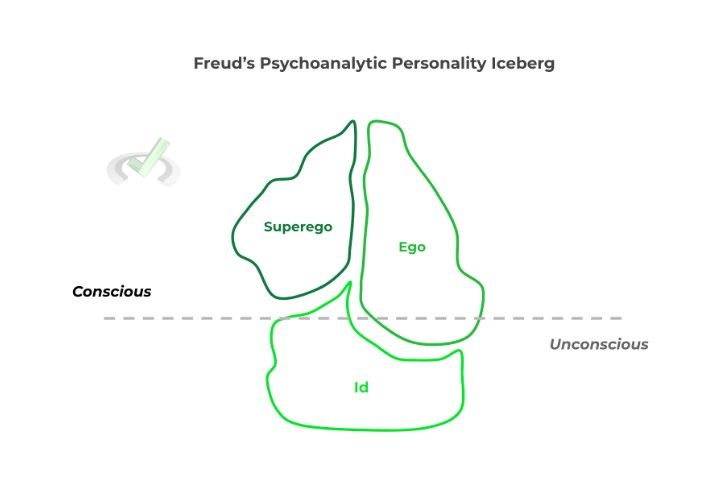
The id of your personality is the component that promotes the immediate gratification or attaining of your desires. Think of it similar to the drive-reduction theory: if there’s an imbalance in one’s drive or arousal state, then it’s your id that works to correct that balance immediately.
However, as you may have noticed, having our entire personality and behavior be guided by our id might not be the best thing. Thus, the 2nd more mature component of our personality according to Freud is our ego which aids in repressing the id when it wants to attain desires in a way that’s not realistic and conforming to society.
Let’s say you’re in line at Starbucks and see a bunch of soccer kids and their moms in line. Your id would tell you to push them out of the way, but your ego is your rational thought that represses that behavior (let’s just wait a couple of minutes for the PSL).
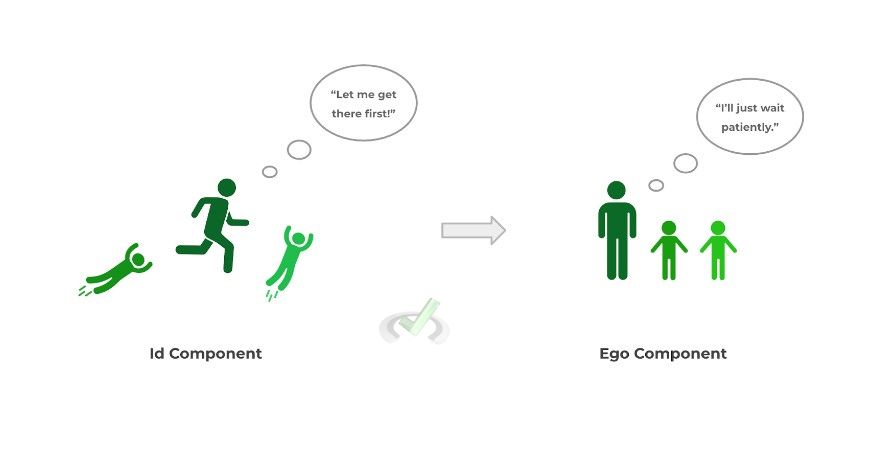
Finally, your superego is the component of personality that acts on ideal standards of morality! In a way, it’s akin to the postconventional morality experienced in Kholberg’s theory. Think of it like a step up from the ego component: while the ego simply aids to help you act in realistic, conventional ways, the superego wants you to act in the most idealized, moral way possible.
For example, let’s say you find a wallet stuffed with cash on the floor with no identification. While initially, you’d want to keep the wallet and cash, your superego encourages you to return the wallet to the lost and found of both of the public places.
(Coming Soon!) Full Study Notes : Theories of Personality Formation
For more in-depth content review on Freud’s psychoanalytic personality theory and other theories regarding personality, check out these detailed lesson notes created by top MCAT scorers.
Important Definitions and Key Terms
Below are some high yield definitions and key terms to refer to when reviewing concepts and ideas about identity and personality.
Term | Definition |
|---|---|
Self-Concept | A basic overall perception of ourselves as a unique, individual person; Accumulation of one’s identities |
Self-Esteem | Describe how highly we value ourselves as unique individual persons |
Self-Efficacy | Describe how confident we are in accomplishing a certain task or in a certain ability |
Kohlberg’s Theory of Identity Formation | One of the theory of development which emphasizes the maturation of cognition and our moral compass throughout life |
Erikson’s Theory of Psychosocial Development | Another theory of development where each stage has an existential problem which needs to be addressed |
Id | One component of Freud’s psychoanalytic theory of personality which initiates the immediate gratification and fulfillment of desires |
Ego | Component of Freud’s psychoanalytic theory of personality which guides our behaviors to be realistic and conforming to society |
Superego | Component of Freud’s psychoanalytic theory of personality which promotes actions to be of the highest, idealized moral values |
Additional FAQs - Identity and Personality on the MCAT!
A. What is the Psychoanalytic Theory – MCAT?
B. What is Incentive Theory – MCAT?
C. How Do You Remember the Psychosexual Stages – MCAT?
D. What Are the Psychosexual Stages – MCAT?
Additional Reading:
- Language Development on the MCAT
- Cognition and Consciousness on the MCAT
- Learning and Memory on the MCAT
- Motivation and Emotion on the MCAT
- Neurobiology on the MCAT
- Psychological Disorders on the MCAT
- Sensation and Perception on the MCAT
- Social Interaction on the MCAT
- Social Processes and Behavior on the MCAT
- Social Structure and Stratification on the MCAT
- Social Thinking and Attitudes on the MCAT



 To help you achieve your goal MCAT score, we take turns hosting these
To help you achieve your goal MCAT score, we take turns hosting these